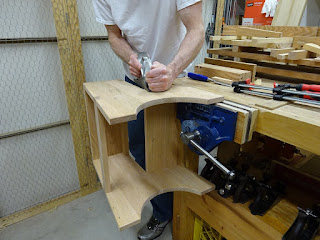Building the prototype 2-step stool was quite helpful in figuring out a few construction details. But where it really helped was in figuring out how to glue up the beast. Not that that stopped me from making a near-disastrous screw-up. I'll get to that later.
Here's the build in pictures and captions.
 |
Got the parts glued up from smaller boards, then to proper dimensions
Back to front: 2 rear side pieces, 2 front side pieces, 2 steps, 3 rails |
 |
| Marking the rear side pieces for dovetails |
 |
| Checking the dovetail shoulders for square |
I spent some extra time making sure my dovetails were cut square to the face. The only "square" that would fit in between tails was a depth gauge, which was square enough. I pared the walls with a chisel until satisfied.
 |
| Checking the dovetail sidewalls for square |
 |
| Transferring tail outlines to pin board end grain |
 |
| Carefully sawing the pins |
 |
| Sawed out the waste and later chiseled to the base lines |
 |
| Dry fit looks good (after some minor fitting and paring) |
 |
| The rear step and the front step dovetailed |
Before I continued, I transferred the dovetail baselines to the three rail pieces.
 |
| Rail (top) sitting on a dovetailed step, showing common shoulder lines |
After the rails were dovetailed and fitted into sockets in the sides, I glued up the rear and front side pieces.
 |
| Two sides cooking in the clamps |
Before finalizing the project and gluing up the whole thing, I decided to fill all the exterior nail holes. I had punched the nails through with a small nail set, which enlarged the holes.
 |
| Example of nail holes |
 |
| Holes drilled out to 1/4" |
 |
| Plugged with 1/4" plugs cut from off-cut scrap |
 |
| Plug glued, cut flush and planed smooth |
 |
| Can you tell how many plugs are in this piece? (at least 3) |
I then cut the arches in the sides that form the feet (no pics). After rehearsing the glue up, I got to it in two stages. First stage was gluing the upper step, rear rail and front upper rail to the sides. The lower step and rail were in place dry to help keep things aligned.
 |
Stage 1: top step, rear rail and upper front rail
Note the cauls used to force the tails down into the pin recesses |
And wouldn't you know it? As I was hammering the top step's dovetails onto the side piece's pins, I noticed too much resistance and a split starting in the step. Turns out I had the top step rotated 180° from proper position. Arrgh! I quickly pounded the thing apart, added more glue and got it right. The split was not complete and will be inconsequential with the step glued to the sides. I can't even see it in the finished piece.


























That looks really nice. The dovetails are excellent.
ReplyDeleteThanks, Andy. I appreciate that. It'll be really useful, too.
DeleteReal good job on those dovetails.
ReplyDeleteLooking good and great reuse of discarded wood.
Bob, still computer less after HD crashes. Using IPad and google does not play well together :-(
Thanks, Bob. I'm looking forward to seeing some dovetails come out of your shop. Maybe on the boring till? Or other cabinets to house all the tools you've been accumulating?
Delete